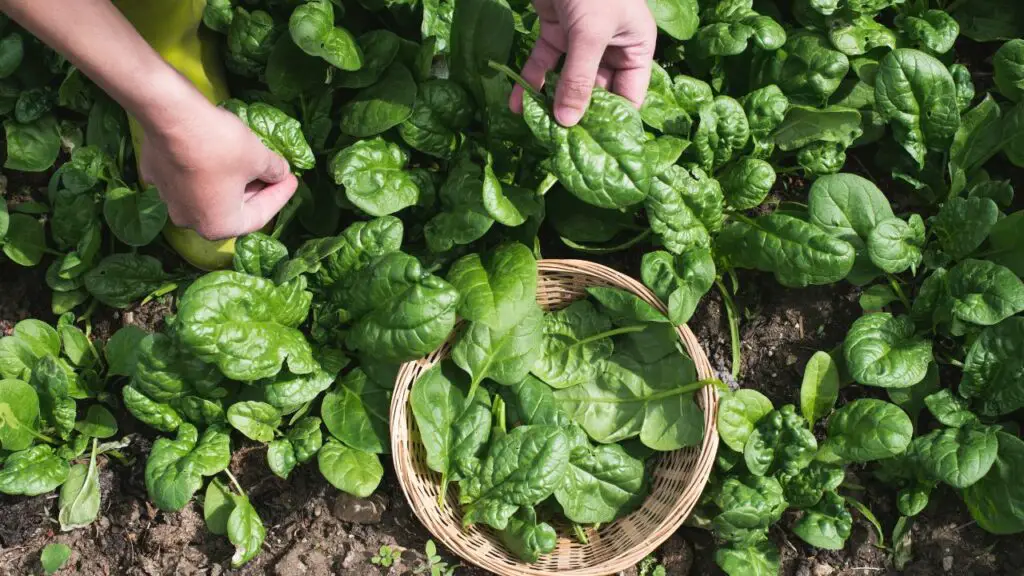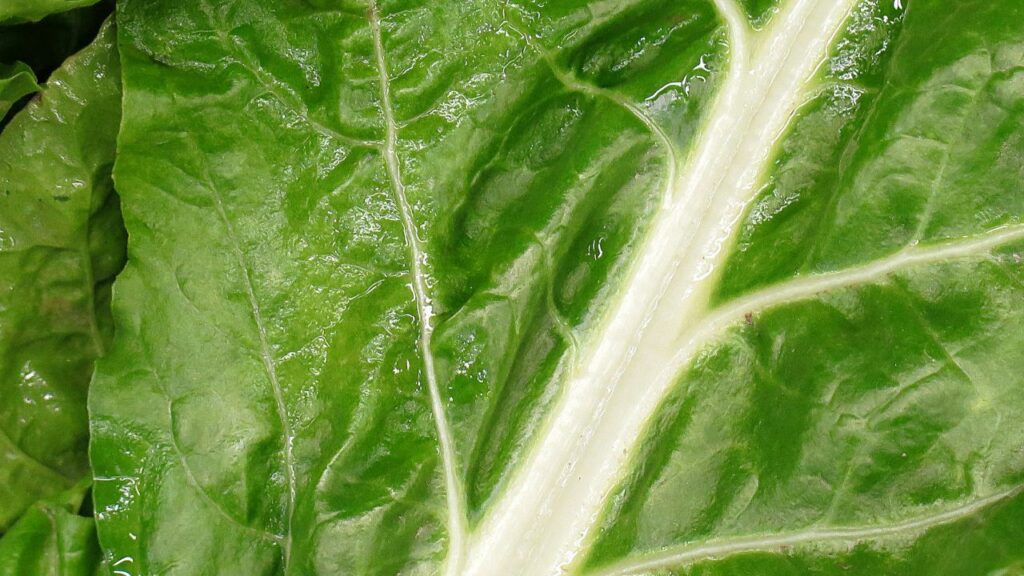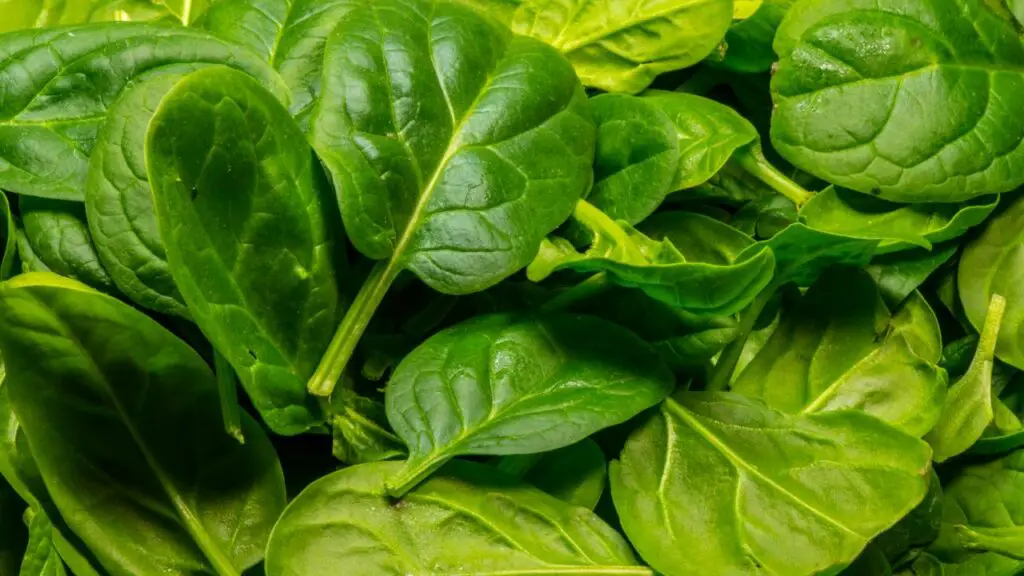If you’re a bunny owner or simply a rabbit enthusiast, you’ve probably found yourself musing over the dietary needs of these adorable, long-eared creatures. One question that often springs up is: Can bunnies eat spinach?
While spinach can be a nutritious addition to your bunny’s diet, it’s important to remember the principle of moderation due to its high oxalic acid content.
But how much spinach can my bunny eat, and what are some safe alternatives?
Can Bunnies Eat Spinach?
Yes, bunnies can safely consume spinach, which is a nutrient-dense leafy green vegetable that offers a range of vitamins and minerals beneficial for your rabbit’s health.
Spinach is an excellent source of vitamins A, C, K, and B9 (folate) as well as minerals like iron and calcium, all of which contribute to your bunny’s overall wellbeing.
However, spinach should only be given in moderation due to its high oxalic acid content. Oxalic acid, when consumed in large amounts, can lead to health issues in rabbits, such as kidney stones and urinary tract problems.
To ensure your rabbit’s health, limit spinach servings to a small portion of their diet, and balance it with other leafy greens that have lower oxalic acid content.
Can Spinach Kill A Rabbit?

The question, “Can spinach kill a rabbit?” may sound intense, yet it’s an important one to address for every responsible rabbit owner.
While spinach won’t cause immediate harm or fatality to your bunny, the ingestion of large quantities over an extended period can indeed lead to significant health problems.
Spinach contains high levels of oxalic acid, a naturally occurring compound that, in excess, can result in kidney damage and urinary tract issues in rabbits. These health conditions not only affect your rabbit’s quality of life but could potentially reduce their lifespan.
Therefore, while spinach isn’t lethal per se, it’s essential to regulate its consumption to maintain your rabbit’s long-term health and wellbeing.
Can Bunnies Eat Spinach Every Day?
While it might be tempting to feed your bunny spinach daily due to its rich nutrient profile, it’s advisable not to do so.
Spinach, despite its numerous health benefits, contains high levels of oxalic acid. This compound, when consumed daily or in large amounts, can potentially harm your bunny’s health.
Therefore, spinach should only form a small part of your rabbit’s diet. Consider it as an occasional treat, not a staple.
To put it in perspective, spinach should make up no more than 5-10% of their total food intake. This equates to about one to two tablespoons of chopped spinach for a 5-pound rabbit.
By maintaining a diverse diet for your bunny, you can ensure they receive a range of nutrients without risking oxalic acid buildup.
Can Bunnies Eat Spinach Leaves?
Absolutely, bunnies can safely munch on spinach leaves, but as with all things, moderation is key.
The leaves of the spinach plant are where the highest concentration of oxalic acid is found. Oxalic acid, while naturally occurring, can pose health risks for rabbits if consumed in large quantities or too frequently.
Therefore, when offering spinach leaves to your bunny, it’s essential to keep the servings small, limiting them to just a few leaves at a time.
Also, be sure to offer these as infrequent treats rather than regular meals. This not only helps to prevent any potential health issues from excessive oxalic acid intake but also encourages a varied diet for your rabbit, which is crucial for their overall health and wellbeing.
Can Bunnies Eat Spinach Stems?

Indeed, bunnies can enjoy spinach stems as a part of their diet. Spinach stems are lower in oxalic acid compared to the leaves, which makes them a safer choice for your bunny’s treat time.
Besides, their crunchy texture can provide a novel sensory experience for your pet, promoting their natural chewing instincts which is beneficial for dental health.
Nevertheless, even with their lower oxalic acid content, it’s important to remember that spinach stems should still be given in moderation.
Feeding your bunny any part of the spinach plant, whether it’s the leaves or stems, should always be balanced with other rabbit-friendly foods to ensure a varied and nutritionally balanced diet. This way, you can keep your furry friend healthy, happy, and satisfied.
Can Bunnies Eat Baby Spinach?
Indeed, your furry friends can enjoy baby spinach as part of their dietary treats. Baby spinach, being harvested earlier than mature spinach, contains slightly lower levels of oxalic acid, which can make it a bit safer for your bunny’s consumption.
The tender leaves of baby spinach can also be easier for your rabbit to chew and digest. Nonetheless, even though baby spinach is a tad safer, it’s crucial to remember that the principles of moderation still hold.
Baby spinach, like its mature counterpart, should only constitute a minor portion of your bunny’s diet.
By maintaining a varied diet with a mix of different safe greens and hay, you can ensure your rabbit enjoys a balanced nutrition profile while minimizing any potential risks from excessive oxalic acid intake.
Can Baby Bunnies Eat Spinach?

As a general rule, it’s wise to refrain from offering spinach to baby bunnies, also known as kits.
Their digestive systems are still in the delicate stages of development and may not be equipped to handle the oxalic acid content found in spinach, which could potentially lead to digestive upset or other health complications.
Instead, consider providing nourishing rabbit-safe milk replacers during their earliest weeks, slowly transitioning to solid foods like alfalfa hay, which is rich in protein and calcium, essential for their growth and bone development.
Once they mature and their digestive system becomes more robust — typically around 12 weeks of age — you can gradually introduce a wider variety of foods, including small amounts of safe vegetables like spinach.
Remember, gradual and monitored introduction of new foods is crucial to prevent any adverse reactions and ensure your baby bunny’s health and well-being.
Can Bunnies Eat Water Spinach?
Indeed, your bunny can enjoy water spinach as a part of its diet. Water spinach, also known as kangkong or morning glory, is a safe vegetable for bunnies due to its lower oxalic acid content compared to regular spinach.
Additionally, water spinach is rich in vitamins A and C, which contribute to your bunny’s overall health, including their vision, immune system, and skin health.
But as with any new food, it’s important to introduce water spinach gradually into your rabbit’s diet.
Start with small amounts and observe your bunny for any changes in behavior, appetite, or digestive health.
This cautious approach helps ensure the new addition to your bunny’s menu doesn’t upset their delicate digestive system and continues to support their health and happiness.
Safe Spinach Alternatives For Bunnies?
Even though spinach can be a nutritious addition to your bunny’s diet, it’s worthwhile to explore safe spinach alternatives to ensure dietary diversity and balance.
Other leafy greens such as romaine lettuce, bok choy, cilantro, and arugula serve as excellent substitutes.
These veggies not only have a lower oxalic acid content, making them safer for more frequent consumption, but they also pack a nutritional punch. Romaine lettuce, for instance, is a good source of vitamin A, while bok choy provides vitamin C and calcium.
Cilantro and arugula, on the other hand, offer unique flavors that can stimulate your bunny’s palate. However, even with these safe alternatives, it’s vital to introduce new foods gradually.
Start with small portions and observe your bunny’s behavior and digestion to ensure they adjust well to the new food. Variety, balance, and careful monitoring are key to maintaining your bunny’s health and happiness.
Summary
It’s clear that spinach can be a part of your bunny’s diet, yet it’s crucial to keep moderation at the forefront. Whether it’s the leaves, stems, baby spinach, or the water variant, each should be offered sparingly due to their oxalic acid content.
However, by incorporating a variety of other safe and nutritious vegetables like romaine lettuce, bok choy, cilantro, and arugula, you can maintain a diverse and balanced diet for your bunny.
Always remember, gradual introduction of new foods and careful monitoring of your bunny’s response ensures their optimal health and wellbeing.





